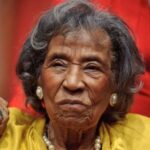 Amelia Boynton was born on August 18, 1911, in Savannah, Georgia. Her early activism included holding black voter registration drives in Selma, Alabama, from the 1930s through the ’50s. In 1964, she became both the first African-American woman and the first female Democratic candidate to run for a seat in Congress from Alabama. That same year, she marched on Bloody Sunday. In 1990, Boynton won the Martin Luther King Jr. Medal of Freedom. Today, she tours on behalf of the Schiller Institute.
Amelia Boynton was born on August 18, 1911, in Savannah, Georgia. Her early activism included holding black voter registration drives in Selma, Alabama, from the 1930s through the ’50s. In 1964, she became both the first African-American woman and the first female Democratic candidate to run for a seat in Congress from Alabama. That same year, she marched on Bloody Sunday. In 1990, Boynton won the Martin Luther King Jr. Medal of Freedom. Today, she tours on behalf of the Schiller Institute.
In 1930, she met her co-worker, Dallas County extension agent Samuel Boynton. The two had in common their impassioned desire to better the lives of African-American members of their community, particularly sharecroppers. The couple married in 1936 and went on to have two sons, Bill Jr. and Bruce Carver. Over the next three decades, Amelia and Samuel collectively worked toward achieving voting, property and education rights for the poor African Americans of Alabama’s farm country.
Boynton’s early activism included co-founding the Dallas County Voters League in 1933, and holding African-American voter registration drives in Selma from the 1930s through the ’50s. Even Samuel’s death in 1963 did not deter Amelia’s commitment to improving the lives of African Americans.
Civil Rights Movement
In 1964, as the Civil Rights Movement was picking up speed, Amelia Boynton ran on the Democratic ticket for a seat in Congress from Alabama—becoming the first African-American woman to do so, as well as the first woman to run as a Democratic candidate for Congress in Alabama. Although she didn’t win her seat, Boynton earned 10 percent of vote.
Also in 1964, Boynton and fellow civil rights activist Martin Luther King Jr. teamed up toward their common goals. At the time, Boynton figured largely as an activist in Selma. Still dedicated to securing suffrage for African Americans, she asked Dr. King and the Southern Christian Leadership Conference to come to Selma and help promote the cause. King eagerly accepted. Soon after, he and the SCLC set up their headquarters at Boynton’s Selma home. There, they planned the Selma to Montgomery March of March 7, 1965.
Some 600 protesters arrived to participate in the event, which would come to be known as “Bloody Sunday.” On the Edmund Pettus Bridge, over the Alabama River in Selma, marchers were attacked by policemen with tear gas and billy clubs. Seventeen protesters were sent to the hospital, including Boynton, who had been beaten unconscious. A newspaper photo of Boynton lying bloody and beaten drew national attention to the cause. Bloody Sunday prompted President Lyndon B. Johnson to sign the Voting Rights Act on August 6, 1965, with Boynton attending as the landmark event’s guest of honor.
Boynton remarried in 1969, to a musician named Bob W. Billups. He died unexpectedly in a boating accident in 1973.


